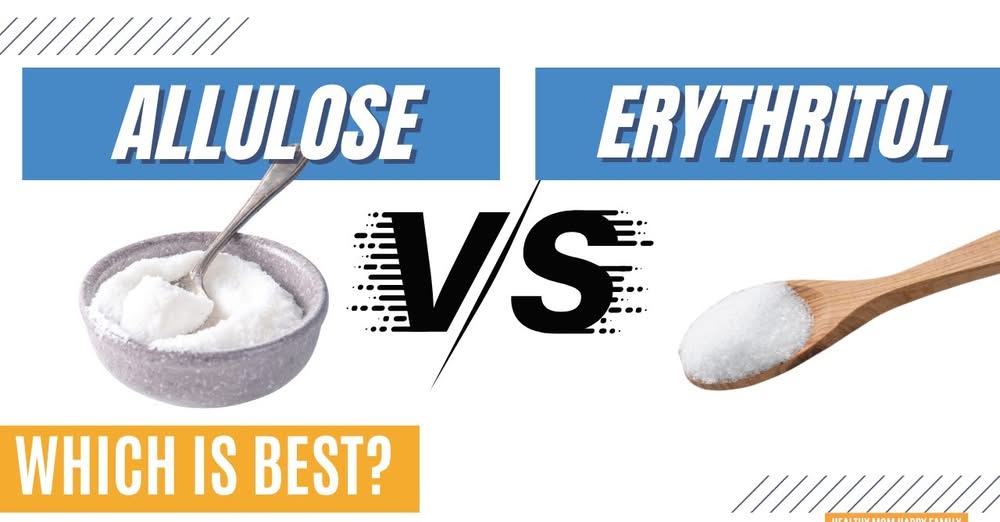What is allulose sweetener ?

Allulose sweetener is a rare sugar that naturally occurs in fruits like figs and raisins. “It’s about 70% as sweet as sugar,” says Anthony DiMarino, a registered dietitian with the Cleveland Clinic. “So a little less sweet than normal sugar.”
Like glucose and fructose, allulose is a monosaccharide, or single sugar. In contrast, table sugar, also known as sucrose, is a disaccharide made of glucose and fructose joined together.
In fact, allulose sweetener has the same chemical formula as fructose but is arranged differently. This difference in structure prevents your body from processing allulose the way it processes fructose.
Although around 70% of the allulose you consume is absorbed into your blood through your digestive tract, it leaves your body via your urine without being used as fuel.
Allulose sweetener also provides 0.2 to 0.4 calories per gram (g), or about 1/10 the calories of table sugar.
Here’s some helpful information for people who have diabetes or are monitoring their blood sugar for another reason: Allulose does not appear to raise blood sugar or insulin levels.
Allulose sweetener is a monosaccharide. It has 90% fewer calories than sucrose, which makes it virtually calorie-free. Researchers have recently found ways to produce allulose on a larger scale, which may allow it to become a popular sweetener in the future.
Is Allulose a Healthy Sweetener?
The FDA states that allulose is “generally recognized as safe” (GRAS).
“Basically, they know that small amounts aren’t going to do any harm to people if they consume it,” DiMarino says. “What I recommend with my patients is that whatever you’re using, whether it’s natural sugar … or any artificial sweetener, is that you use your best judgment and use it in small amounts in moderation. Because we don’t want to rely on them too much.”
If you follow these suggestions, allulose can be a great replacement to regular sugar.
“What’s interesting is that it’s not metabolized by the body. It’s absorbed by the small intestine, but then actually excreted. So none of the calories get absorbed or stored in your body,” DiMarino says. “With the limited research that’s been done, it’s been found that [allulose] doesn’t have effects on blood sugars or an insulin response.”
Potential Health Benefits of Allulose

It may help regulate blood sugar
Allulose may turn out to be a powerful tool for managing diabetes.
It may increase fat loss
It may protect against fatty liver
Is allulose safe?
Allulose appears to be a safe sweetener, though more research is needed.
The Food and Drug Administration (FDA) has added it to the list of foods generally recognized as safe. However, it’s not yet allowed to be sold in Europe.
A 12-week study in allulose-fed dogs found no toxicity or other health problems related to the sweetener .
In the previously mentioned 90-person study, doses of 5 to 15 g (1 to 3 teaspoons) per day for up to 48 weeks were not associated with any negative effects.
In fact, the research found several health benefits, including improvements in fatty liver and the body’s ability to process glucose.
Still, the results are not completely positive. A test-tube study on mouse cells suggests that allulose may be linked to muscle cell injury under simulated exercise conditions.
It’s unclear whether these findings would apply to people.
So far, allulose appears safe and is unlikely to cause health problems when consumed in moderation. However, as with any food, individual sensitivities are always a possibility.
Does Allulose Cause Any Side Effects?
Most people who eat allulose sweetener in moderation won’t notice any major issues. But it’s important to note that everyone has a different tolerance to artificial sweeteners. “One side effect that people tend to see is some gastrointestinal discomfort, like maybe some bloating, or some issues going to the bathroom,” DiMarino says.
For that reason, it’s a good idea to add small amounts of allulose to your food at first.
“It’s more so trial and error in finding how much is your limit,” DiMarino says. “But if you eat it in small amounts over the period of the day, or just sparingly throughout the week, you shouldn’t end up having any kind of side effects.”
What is allulose made from?
Allulose sweetener naturally occurs in a few foods. However, commercial allulose is made by converting fructose, which is found in corn and other plants, to allulose.
Is allulose a fake sugar?
Allulose naturally occurs in small amounts in foods such as figs, molasses, and raisins.
Is allulose the same as stevia?
Allulose and stevia are both low calorie sweeteners, but they’re not the same. Stevia is an extract from the plant Stevia rebaudiana. Allulose sweetener is a sugar that naturally occurs in some foods, including figs and wheat, but it can also be made from fructose as a commercial food product.

Usage of Allulose
Because allulose tastes so much like sugar, does not raise blood glucose, and provides potential health benefits, it’s a great option for ketogenic lifestyles. It can be used in a variety of applications, including:
- Beverages: Allulose sweetens drinks like coffee, tea, and soft drinks without adding carbs.
- Baking and cooking: Allulose sweetener can be used in place of sugar in many recipes, although some adjustments may be needed due to its unique properties (See the next section for tips).
- Dairy products: A spoonful of allulose adds a touch of sweetness to plain yogurt. In addition, since it freezes well, it’s ideal for making ice cream.
- Confectionery: Allulose sweetener is an excellent sweetener for chocolates, candy, and similar treats.

Allulose vs Erythritol
Have you been researching sugar alternatives and wondering what the difference is between allulose vs erythritol? Tune in as Erin reveals the truth between allulose vs erythritol and which is the best ?


